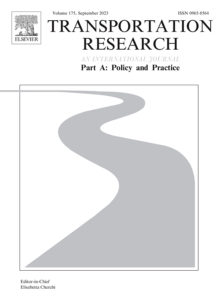Článek zjišťuje, jaké byly dopady pandemie covid-19 na dojíždění do práce a práci z domu a zda se dopady lišily mezi ČR a Izraelí.
Abstrakt: The COVID-19 crisis has forced many people to work from home, rather than at their regular workplace. This paper aims to assess the impact of the pandemic on telecommuting and commuting behavior after the end of the crisis: Will people embrace teleworking and reduce commuting, even to some extent, or will they resume their pre-pandemic work patterns? This study, implementing a cross-country survey from Israel and Czechia, combines data regarding revealed preferences about work habits before and during the pandemic and stated intentions data regarding anticipated work patterns when life returns to „normal“ after the pandemic. Two models were used for the data analysis, one addressing factors that affect the increased/decreased teleworking trend and the other addressing factors that affect the frequency of actual commutes. The results reveal that most respondents (62% in Israel and 68% in Czechia) will maintain the same telecommuting/working from home balance. About 19% of respondents in both countries expressed their intention to reduce the number of commuting days, while 6% stated they would increase out-of-home days. However, these estimates rely only on workers‘ expectations not accounting for employers‘ point of view and other constraints they may have. Not accounting for potential bias, a moderate reduction of 6.5% and 8.7% (in Israel and in Czechia, respectively) in the number of commuting trips is expected in the post-pandemic era. The anticipated decrease in commuting days is accompanied by an increase in teleworking: from 10% to 14% among those who work more than 20 h a week (in both countries) and a drop in the rate of those who telework five hours or less a week (down from 73% to 63% in Israel and from 76% to 70% in Czechia). Self-employment, travel time to work, working solely on premise during the lockdown, and personal preferences regarding telework versus working away from home were found to significantly contribute to a decrease in the number of commuting days and to an increase in teleworking. An interesting finding is the high probability of increased teleworking among people who teleworked for the first time during the lockdown or who increased their teleworking time during the lockdown. This indicates that the teleworking experience due to the pandemic has enabled some people to view working from home as viable. Although, overall, the change in working habits does not seem dramatic, our results suggest that hybrid schemes for combining on premise and telework are expected to be adopted by some sectors.
Citace: Kogus A. et al. (2022). Will COVID-19 accelerate telecommuting? A cross-country evaluation for Israel and Czechia. Transportation Research Part A: Policy and Practice, 164 (2022), pp. 291-309, https://doi.org/10.1016/j.tra.2022.08.011
Ke stažení: ↓ Will COVID-19 accelerate telecommuting? A cross-country evaluation for Israel and Czechia



